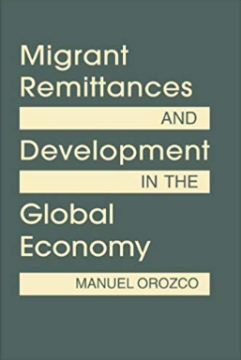The Earthquake’s Impact on Remittances
The earthquake in Haiti has exacerbated an existing distress during the international recession and increased uncertainty of what to do and how to help.
Due to recent economic challenges experienced by migrants as a result of the global Covid-19 pandemic, a conservative estimate shows that remittances to Latin American and Caribbean countries will register a negative seven percent decline in 2020 relative to 2019, from $76 billion to $70 billion. During the "Impact of the Covid-19 Pandemic on Migrants and Remittances to Latin America and the Caribbean" webinar hosted by the Migration, Remittances and Development program on April 2, panelists discussed the economic and health consequences of the pandemic for migrants and how this will impact Latin America and the Caribbean – a region that is highly dependent on money received from family and friends working in the United States. This event was moderated by Manuel Orozco, director of the Migration, Remittances and Development program. Orozco was joined by panelists Mariellen Jewers, Piero Coen and Gene Nigro.
Economic and Health Impacts
The job sectors that are currently being impacted during the Covid-19 pandemic distinguish this crisis from past economic crises. Coen emphasized that with approximately 75 percent of the Latin American and Caribbean population living off of their day-to-day income, total isolation is not possible for many. Jewers pointed out that foreign-born workers in the United States often have jobs that do not offer health benefits for employees – adding to the already pronounced problem that one in five migrants lack health insurance. In addition to limited healthcare access, Latino immigrants are known to live in higher populated households, making it harder to exercise self-isolation resulting in increased risk for exposure to the virus.
Economically, Orozco indicated that the average savings capacity of migrants in the United States is $5,000 USD, in addition to some low-value assets. Those who are continuing to send remittances to friends or family will suffer a depletion of their resources, a loss of funds that will take time to recover from. He also projected that 90 percent of those who are unemployed will not send remittances for the next nine months. Coen mentioned that AirPak is estimating an impact on remittances of 15 to 25 percent. He also pointed out that countries that have been enforcing stricter social distancing measures, such as like Costa Rica, El Salvador, and Honduras, are currently experiencing short-term declines in their remittance transfers. This contrasts with countries such as Mexico and Nicaragua that have taken lighter measures where remittance transactions have been increasing.
Digital Vehicles for Sending Remittances
The combination of individuals having to stay home and the temporary closures of remittance sending businesses has motivated people to transition to online remittance sending – sooner than some remittance senders had anticipated. As mentioned by guest speaker, Paul Dwyer, “anyone who was going to make the switch [from in-person sending to digital sending] is switching now.”
Mobile wallets are not only more affordable (at approximately a one percent sending fee) but they are completely digital, providing parties the ability to send money across country borders to the recipient of their choosing, without anyone having to leave their home. Mobile wallets also promote financial inclusion through their relationships with banks and their ability to transfer money directly into checking or savings accounts. Nigro explained that the switch to mobile wallets linked to large banking institutions will contribute to greater financial inclusion worldwide. Despite the shift to digital during the pandemic, he emphasized that "cash is here to stay" and expects recovery to be fast.
Path Forward
Jewers was able to offer participants insight on actions that the community and the US government can take in order to lessen the hardships migrants and Latin American and Caribbean countries are facing. While there is some relief available to migrants through local health services and community organizations, it is imperative that individuals make themselves knowledgeable and available to nonprofits and health centers in their communities that are specifically working to provide medical help to undocumented populations.
Additionally, Jewers spoke about the importance of including all workers with Individual Taxpayer Identification Numbers (ITIN) when creating cash assistance programs. Currently, it is being tied to social security numbers, which does not include undocumented workers that pay taxes to the United States.
Although there are still high levels of uncertainty in regards to how long and how much of an impact this pandemic will have on vulnerable communities and countries all around the world – as Manuel Orozco concluded the event by saying – it is important to remember that “resilience is one of the highlights of humanity, we are hopeful but realistic” for what the next few months will bring.
The earthquake in Haiti has exacerbated an existing distress during the international recession and increased uncertainty of what to do and how to help.
Is there a direct correlation between youth unemployment and the social unrest? What accounts for such high levels of youth unemployment and what effect has it had on the region?
How do patterns of migration and remittances differ across regions? What kinds of frameworks support the contributions of remittances to local development?
 Main Photo: Mediamodifier / Pixabay
Main Photo: Mediamodifier / Pixabay
